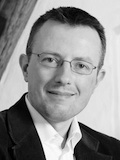GOTO is a vendor independent international software development conference with more that 90 top speaker and 1300 attendees. The conference cover topics such as .Net, Java, Open Source, Agile, Architecture and Design, Web, Cloud, New Languages and Processes
Mads Troels Hansen, TweetAgile Coach and Scrum Trainer

Biography: Mads Troels Hansen
Mads has worked almost two decades with Software Development as Developer, Scrum Master, Product Owner, Head of Development and Agile Coach in different Danish companies. As a practitioner, he helps teams becoming more agile and organizations changing from traditional ways of thinking. He is also Professional Scrum Trainer and Management 3.0 trainer and uses training to accelerate a common foundation for further improvements and results.
For almost ten years, one of his main passions has been using Scrum, Agile and Lean Principles in order to enable high productive distributed teams across Denmark, Eastern Europe or Asia. He prefers to work with teams and organizations for a longer time to facilitate sustainable change. Mads is a frequent speaker at different international conferences and local events and he is active in the Danish agile community. Occasionally he shares his thoughts and experience on twitter.com/madsth or blog.lean-agile.dk.
Presentation: TweetDo's and don'ts for Distributed Scrum
More and more organizations develop software with distributed teams and the most effective setups are using Scrum and Agile. Unfortunately, the majority of organizations introduce a lot of traditional governance and wasteful structures on top of the distributed Scrum to feel more in control. It creates a structure that works against the principles behind Scrum and suppresses the potential of the distributed teams.
Hear about common patterns from successful distributed Scrum setups and get examples on how to apply those patterns in your own context. Maintaining and improving a high productive global organization require regular global gardening and Lean thinking. Most organizations do not prioritize this activity and you will hear about typical failure scenarios to avoid. The patterns are derived during the last 10 years from practical work with Agile/ Scrum in different Danish organizations with teams in Eastern Europe or Asia
